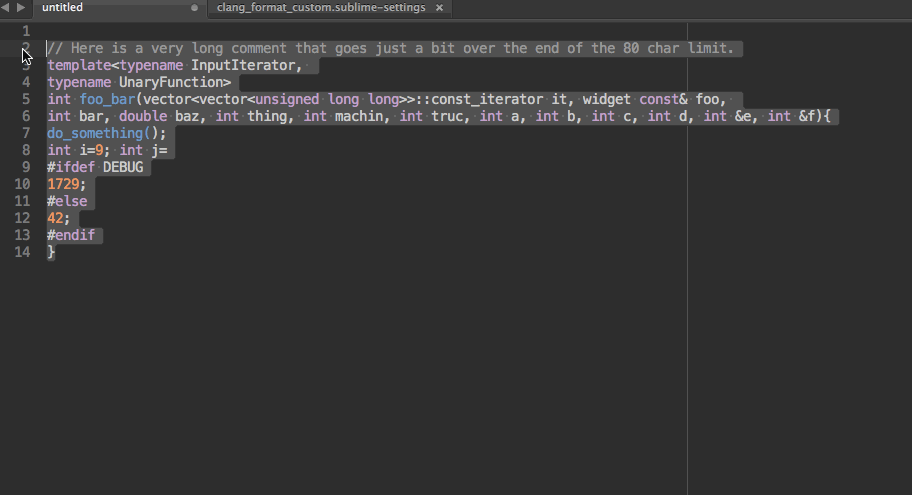Clang Format
A C++ code formatter based on Clang Format, for beautiful code with minimal effort in Sublime Text 3
Details
Installs
- Total 58K
- Win 22K
- Mac 14K
- Linux 22K
| Feb 6 | Feb 5 | Feb 4 | Feb 3 | Feb 2 | Feb 1 | Jan 31 | Jan 30 | Jan 29 | Jan 28 | Jan 27 | Jan 26 | Jan 25 | Jan 24 | Jan 23 | Jan 22 | Jan 21 | Jan 20 | Jan 19 | Jan 18 | Jan 17 | Jan 16 | Jan 15 | Jan 14 | Jan 13 | Jan 12 | Jan 11 | Jan 10 | Jan 9 | Jan 8 | Jan 7 | Jan 6 | Jan 5 | Jan 4 | Jan 3 | Jan 2 | Jan 1 | Dec 31 | Dec 30 | Dec 29 | Dec 28 | Dec 27 | Dec 26 | Dec 25 | Dec 24 | Dec 23 | |
|---|---|---|---|---|---|---|---|---|---|---|---|---|---|---|---|---|---|---|---|---|---|---|---|---|---|---|---|---|---|---|---|---|---|---|---|---|---|---|---|---|---|---|---|---|---|---|
| Windows | 0 | 2 | 5 | 2 | 4 | 5 | 6 | 5 | 7 | 4 | 2 | 3 | 2 | 1 | 3 | 1 | 2 | 5 | 2 | 3 | 3 | 1 | 3 | 6 | 5 | 3 | 6 | 3 | 3 | 3 | 2 | 5 | 8 | 2 | 4 | 2 | 3 | 5 | 1 | 3 | 5 | 3 | 3 | 1 | 3 | 4 |
| Mac | 0 | 2 | 1 | 2 | 1 | 0 | 0 | 1 | 1 | 0 | 2 | 3 | 2 | 1 | 0 | 3 | 5 | 0 | 3 | 3 | 1 | 3 | 1 | 1 | 1 | 2 | 2 | 1 | 3 | 2 | 0 | 3 | 1 | 4 | 0 | 0 | 1 | 3 | 3 | 0 | 0 | 2 | 0 | 2 | 1 | 3 |
| Linux | 0 | 6 | 2 | 2 | 5 | 4 | 1 | 1 | 4 | 4 | 3 | 6 | 0 | 3 | 2 | 5 | 2 | 2 | 4 | 5 | 1 | 3 | 3 | 3 | 2 | 3 | 2 | 3 | 0 | 2 | 2 | 4 | 3 | 2 | 3 | 6 | 1 | 1 | 1 | 5 | 1 | 0 | 2 | 4 | 0 | 1 |
Readme
- Source
- raw.githubusercontent.com
Clang Format
What it does
Clang-format is a tool for formatting C++, built on LLVM. This is a package that allows you to run it easily from within Sublime Text.

About
In this package, we provide an alternative wrapper around clang-format for use within Sublime Text 3. Whilst LLVM does provide a very simple plugin to work with Sublime Text here, it doesn't really exploit any of the Sublime Text package functionality. We add new features such as customising the style from a settings file, selecting styles using the Command Palette, and easier installation.
Installing
- Install
clang-formatin one of the following ways:- Install using your package manager, e.g.
sudo apt-get install clang-formatorsudo apt-get install clang-format-5.0. - Download the entire LLVM toolchain
and extract the
clang-formatbinary. Just extract the.tar.xzfile and copybin/clang-formatinto your PATH (e.g./usr/local/bin).
- Install using your package manager, e.g.
- Install this package through Package Control in the usual way.
- Set the path to the clang-format binaries. You can do this from within Sublime
Text by choosing
Clang Format - Set Pathfrom the command palette. Hint: the path should look something like this[path/to/clang]/clang/bin/clang-format. If clang-format is in your system path, you shouldn't need to do anything.
Use
- Default shortcut is
super+option+aon OSX andoption+cmd+aotherwise. This will apply clang-format to the selection. - From the command palette, you can select the formatting type by using
Clang Format: Select Style. You will find the small number of defaults, and also a new 'Custom' entry. Selecting this entry allows you to customise the style through a settings file. You can access it from the main menu, underPackage Settings. In this file you can add custom rules, such asAllmenstyle braces, and different indents. For examples see http://clang.llvm.org/docs/ClangFormatStyleOptions.html. - Settings for the 'Custom' format and others are available through the Sublime Text preferences.
- It is possible to run the formatter on every save to a file, change settings
to
"format_on_save": true. - To run the formatter in one stroke, press
ctrl+efor windows and linux orsuper+efor OSX. You can always change the keybinding in the keymap to your liking. - To change settings on a per-package basis, add them under
ClangFormatkey, example project.sublime-settings:
{
"folders": [],
"settings": {
"ClangFormat": {
"format_on_save": true
}
}
}
If You Liked This
… And want to contribute, PR's gladly accepted!
Maybe you'll like my other plugin, iOpener. It lets you open files by path, with completion, history, and other goodies.
Otherwise, why not pop on over and star this repo on GitHub?
Credits
Thanks to the LLVM project for doing the hard work, including writing clang format, and also the original Sublime Text plugin on which this package is based.
Also thanks to y0ssar1an, Bendtherules and other contributors for their improvements!
Finally
Why not go and watch the video that got me interested in clang-format in the first place?
